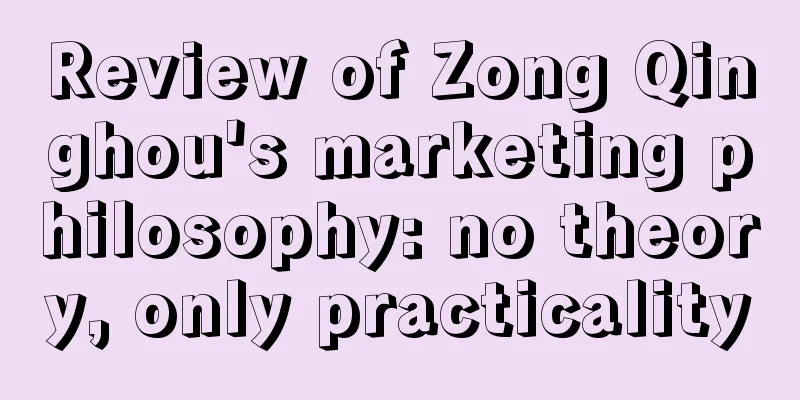Review of Zong Qinghou's marketing philosophy: no theory, only practicality

On the day Zong passed away, I wrote this:
Having experienced the failure of the new consumer entrepreneurship wave, I think new consumers should learn entrepreneurship from old consumers. Mr. Zong is the most worthy old consumer entrepreneur for us to learn from, and there may be no one else. So, today I want to study a few topics with you: Wahaha is able to launch many popular products. What is the marketing model behind it? Wahaha has launched so many new products. What is your experience in quickly opening up the market? How did Wahaha defeat its competitors? What is Mr. Zong’s competitive strategy? If you want to build a national distribution network, what can you learn from Wahaha? What is the reason why Wahaha has been able to maintain its leading position for many years and its competitors cannot shake it? What are the reasons for Wahaha’s declining performance to date? 1. Competitive strategy: strike back, change the competition, and expand the marketIf you want to know whether an entrepreneur is good or not, ask his competitors and you will get the most reliable answer. In 1998, a reporter interviewed He Boquan, the founder of Robust. The reporter asked him: Who do you admire most? He Boquan replied: "It's Zong Qinghou of Wahaha." Back then, Robust and Wahaha were the twin stars of China's beverage industry. The two sides fought for many years, and the two founders were both enemies and friends. Why did he win such high respect from his opponents? How did Zong Qinghou formulate his competitive strategy? What are his principles? The first competitive strategy: "Strike back"At that time, Wahaha chose the fruit milk track, but Robust was the first to make children's fruit milk and had already achieved considerable success in the market. Moreover, the recognition period of this market had passed. But Zong Qinghou believed that this was the best time for a company to enter the market. Wahaha is very good at entering the market as a latecomer, and almost all of their products are latecomers. In 1992, Wahaha launched Eight Treasure Porridge to compete with Yinlu; in 1996, Zong Qinghou saw the rise of the mineral water category and launched purified water; in the same year, it launched AD calcium milk to compete with Robust; in 1998, Wahaha launched Fanta to compete with Coca-Cola; in 2005, Wahaha launched Nutri-Express to compete with Little Foreigner... Wahaha uses the follow-up strategy for almost all its products. Why does Zong Qinghou think that the follow-up strategy is so important? Because competitors can help you cultivate the market and product categories, and verify which experiences are pitfalls and which are real experiences. Entering the market after competitors is the most efficient. But there is a prerequisite for this strategy to succeed. Because Wahaha has established a strong brand and channel network, it is very efficient to launch a new product. With this premise, plus the strategy of striking back, Wahaha's products can be a big hit. This strategy is actually very similar to Tencent's. When Tencent sees a potential APP from an Internet company, it will immediately copy the same thing and surpass you. Tencent Video entered the market later, but it is now the top 3 in China's video field. Why can Tencent do this? Because Tencent has money and traffic. First, it has money because it has built up a huge capital pool over the years. Second, it has traffic because Tencent is a large Internet matrix. When it promotes any product, it can immediately generate huge traffic to make it a hit. Although Tencent and Wahaha are in different industries, their business strategies are the same, so it is said that "Wahaha is the Tencent of the beverage industry." Many people may be familiar with the business strategy of "strike first after being attacked", but the latter two strategies may be unfamiliar to everyone. The second competitive strategy: "Variation fighting"Wahaha was constantly catching up and snatching the market share of many people. Many people regarded Wahaha as an imaginary enemy and wanted to snatch its market share. Those who wanted to snatch Wahaha's market share usually used the low-price strategy. I entered a new market and my price was lower than that of the market leader, so I could snatch your market share. What was Wahaha's countermeasure? When a new entrant or competitor enters the market and starts to lower prices, they choose not to fight back. Zong Qinghou's judgment is based on the fact that the other party is likely to disrupt your market by sacrificing this product. If you also lower your price at this time, your market will be in chaos. When will they start to move? When the competitor has almost completely conquered the market with low prices, they will definitely want to make money one day and raise prices. When they do, Wahaha will suddenly launch a price war. The competitor will be caught off guard and will begin to collapse. Because the competitors had made a lot of price subsidies in order to compete for the market in the early years, and they had no profit. At this time, if Wahaha continued to fight a price war, the competitors would not be able to hold on. Many competitors collapsed because of Wahaha's strategy. Zong Qinghou named his strategy "playing the piano". Because playing the piano must pay attention to rhythm. Zong Qinghou often said that we must control the market and not be controlled by the market or our competitors. The key to controlling our competitors is rhythm. When our competitors lower their prices, we should avoid their attacks and wait for the right opportunity to strike back and regain control of the market. This is the "variation of fighting" and "piano strategy". The third competitive strategy: "Expanding the market"Back then, Wahaha's biggest rival was Robust. Their battle in the market had reached a certain level of intensity. Let me give you some examples. In 1994, Wahaha launched a series of fruit milks with six flavors. These six bottles of fruit milk were lined up in a row, occupying a large retail space. Children loved the six flavors and could drink them at once. This approach caught Robust off guard. After being suppressed by Wahaha for the first time, Robust wanted to make a comeback. In 1995, He Boquan, the founder of Robust, found that about 33% of children in China did not have enough calcium intake, so he took the lead in launching Robust calcium milk, a product for children to supplement calcium, and it was recommended by the Chinese Nutrition Society. Robust regained the initiative in the market. This transformation is very important, because early fruit milk was lactic acid milk, and its positioning was leisure beverage, but the emergence of calcium milk completely directed this battlefield to functional demands. If a beverage is good for the health of children, parents will definitely be willing to buy it. The next year, Wahaha launched AD calcium milk to target Robust's calcium milk. The product concept is that if you want to benefit calcium absorption, you must maintain health and nutritional balance, so AD calcium milk is better. Zong Qinghou also specially got the recommendation of the International Nutrition Institute. In 1998, Robust upgraded this concept with a surprising move, launching a "Health Express Yogurt", which is AD calcium milk with bifidobacteria factor, which immediately made the functional appeal soar to the peak. Moreover, the recommendation endorsement it received was the key scientific research and public relations achievement of the National Eighth Five-Year Plan, and the first health food approval certificate issued by the Ministry of Health. Wahaha could no longer improve the efficacy, so it launched a 200 ml large-capacity AD calcium milk with the same unit price. In 1999, Robust responded to the challenge and launched a similar large-capacity calcium milk, but it made some adjustments to the product and developed a series of products such as Tornado Calcium Milk and Grainy Fruit Calcium Milk. In the same year, Wahaha made a breakthrough in nutritional ingredients and launched a new generation of products - Wahaha Iron Zinc Calcium Milk. Robust and Wahaha have been fighting fiercely. But there is a very obvious feature in their war, that is, the fruit milk war is full of smoke, but the two companies have never engaged in a price war, but only upgraded concepts and products. Why not engage in a price war? I think this is especially worth learning for Chinese business operators. If you engage in a price war with your competitors, it will definitely be a lose-lose situation in the end. Because you have no profit, your competitors have no profit, and you just give consumers a bargain. But if you innovate and upgrade your products, the final result is a win-win situation. Wahaha and Robust have occupied half of the Chinese yogurt market because of product wars. Why was this achieved? Because the concept was constantly upgraded and intertwined, which made Chinese consumers and the entire market excited, and the decline of this product was repeatedly postponed. What does it mean that the decline of a product is delayed? Almost no product can be popular in the market forever. It must be a best-seller within a few years and then gradually decline after a few years. This is the life cycle of a product. As early as 1995, some experts predicted that the life cycle of fruit milk would come to an end and it would be replaced by jelly or some other puffed food. However, due to the continuous innovation of Wahaha and Robust in nutrition concepts, the experts' predictions came true and these two products have been selling well for many years. To this day, AD calcium milk still maintains a certain market share in the market, and many people are still buying this product. The most important thing is that because of the concept war between them, almost all small players in the market were eliminated. Around 1994, there were 10,000 fruit milk companies of all sizes in China, distributed in various regions, competing with Wahaha and Robust at low prices. Small players under the tailing strategy were like lice, causing headaches and making the leaders very annoyed. But later, the two large companies fought a concept war, upgraded their technology and products, and almost eliminated all the small players. By around 1998, 80% of the companies in the domestic fruit milk market had disappeared, and all the small players were eliminated. So you see, the truly smart competition is not a fight to the death, but rather working together to expand the market. Let’s summarize Zong Qinghou’s competitive strategy: strike back in product strategy, change the pricing strategy, and expand the market by competing with key competitors. 2. Zong Qinghou’s brand concept: no theory, only practicalityIf I were to express Zong Qinghou's brand concept in one sentence, I think it would be: There is no theory, only practicality. How do you understand practicality? I think there are several points: 1. Practicality = Dare to challenge the logic that everyone believes inZong Qinghou has many unique brand concepts and dares to challenge the logic that everyone believes in. This may not be known to everyone. Let me give you a more representative example. A president of Coca-Cola once said something very impressive: "Even if all Coca-Cola factories around the world were burned down, Coca-Cola can stand up again the next day with this "brand". " Zong Qinghou disagreed with this statement. He said that Coca-Cola might just stand up, but it might not necessarily succeed. He said: "If Coca-Cola wants to stand up again, it needs funds, equipment, talents and marketing networks. The reason why people are willing to give you these things is that everyone believes that Coca-Cola can make people money. The premise of making money is not just based on popularity, but also on the combination and allocation of various resources." There is an example from the Chinese market that can illustrate Mr. Zong’s point. At that time, there was a very well-known brand in Guangdong called Aido, which made VCDs. This brand invested about 300 million yuan in advertising in just three years and suddenly became a very well-known home appliance brand in China. Later, the company went bankrupt because of its aggressiveness. They owed an advertising agency 20 million yuan, and because they had no money to repay the debt, the agency could only use 20 million yuan to exchange for the right to use the Aido VCD brand. The agency used the Aido brand to sell products, but it didn't sell at all, so it gave up after half a year. You see, just having a well-known and strong brand cannot actually help you get back on your feet. Zong Qinghou also has a judgment that is different from many people, that is, brand extension. No matter what product Wahaha makes, it uses the Wahaha family brand, whether it is children's nutritional liquid, eight-treasure porridge, or AD calcium milk, it is all called Wahaha. However, international companies believe in positioning theory, which is completely contrary to Wahaha's brand extension theory. Positioning theory believes that consumers’ mental resources are limited and a brand can only represent one category. If a brand represents multiple categories, consumers’ minds will be confused and the brand will decline. The most representative example is Procter & Gamble. In the shampoo field, Head & Shoulders fights against dandruff, Pantene nourishes, Rejoice smoothes, and Vidal Sassoon promotes professional styling. Procter & Gamble has eaten into the shampoo market with different brands. This is the brand positioning theory that advocates that brands are equal to categories and a typical case of multi-brand strategy. Zong Qinghou believes that multi-brand is of course good, but you have to know whether the company's monetary resources are abundant. What he meant was that the reality currently faced by the vast majority of Chinese companies is that they simply do not have enough money or talent to implement a multi-brand strategy. Under such circumstances, attempting to attack from all sides and defeat them one by one is likely to be just a wishful thinking. To put it simply, if you want to build a brand now, you may need 10 million and 4 key persons in charge to solve the problem. But if you divide this brand into 4 product lines, each of which represents an independent brand, you may need 4 talents before, but now you may need 16 talents. You may need 20 million to solve the problem before, but now you may need 80 million to solve the problem. Zong Qinghou believes that brand extension is good, but it is only good in theory, and the reality is often bleak. 2. Practical = do not believe in any theory, and adapt according to the actual situationWe have talked about the Wahaha Group before. It has always believed in the family brand strategy and does not do brand extension. But it has an exception, and Feichang Cola is an exception. "Wahaha" and "Feichang Cola" are both registered trademarks. This is a dual-brand strategy. Why is the brand strategy of Fanta Cola different from that of Wahaha’s other product lines? Considering that there are already powerful competitors such as Coca-Cola and Pepsi in the Chinese market, Wahaha's simple brand extension or simple multi-brand strategy is not a good choice. Because Wahaha has a certain brand image, it has too much baggage from the past to enter the powerful cola market, and consumers will have cognitive errors. But if I am not called Wahaha today, I will be called Feichang Cola. Using Feichang Cola, a little-known brand, to impact the market of Pepsi and Coca-Cola will be too weak, so it was finally called "Wahaha Feichang Cola", which is Zong Qinghou's workaround. Zong Qinghou believes that "everything can be established if it changes, and it will be abolished if it does not change." If a brand extension is not used properly, it may be a Waterloo in the development of an enterprise, but if it is used properly, it may also become an accelerator for the enterprise to take off. The key lies in how to do it. This is his pragmatic view. 3. Practicality = What is closest to the consumer is the most correctZong Qinghou's brand practicality is that the one closest to consumers is the most correct. You see, the name Wahaha is very distinctive. How did they come up with this name? Wahaha solicited names from the public through local media. At that time, many people signed up to give him names, most of which were Su, Jin, Bao, etc. Zong Qinghou finally locked on a name submitted by Zhu Songling, the director of a children's palace in Shangcheng District, Hangzhou, called "Wahaha". Mr. Zong recalled that there were two very important reasons for choosing these three words. First, two of the three words "Wahaha" contain the final vowel "a", which is the first sound a child will make. It is easy for children to remember and say this name. Second, hahaha represents happiness. People of different skin colors and nationalities all use hahaha to express happiness. Wahaha is a name that can be called by adults and children, people of all nationalities and skin colors. So, this name is good. Let’s look at the slogans of Wahaha. The slogan of the children’s nutrition liquid is “Drink Wahaha, and your meals will taste delicious”, the slogan of Nutri-Express is “Drink a bottle in the morning, and you will be energetic all morning”, and the slogan of Fanta is “Chinese people’s own cola”. All of Wahaha’s slogans are common sayings. Today, the concept of brand has been developed for many years. We think that the slogan should be a colloquialism, which is correct. However, brands were still a rare species in China at that time. People did not have such avant-garde brand concept and still thought that brands were highbrow. When Wahaha was making nutrient solution, its rival, Sun God, had a highbrow brand strategy. Sun God was the first company in China to do CI, which stands for corporate visual identification system. Today, those of us who work in branding may be familiar with this term, but at that time Sun God spent about 10 million yuan, which may be equivalent to 100 million yuan today, to build the corporate visual identification system. After that, the entire Sun God product and brand concept were very trendy and fashionable. The advertisements it ran on CCTV were also very fashionable. "When the sun rises, our love will last forever." This slogan may be remembered by many people born in the 1980s and 1970s. Therefore, many people criticized Zong Qinghou at that time, saying that his company was too rustic. Zong Qinghou's idea at that time was that brands are not for show, but should be developed in a way that benefits the company's profits. We are making mass consumer products that are closely related to the Chinese people, and I can't do that. When it is local, it should be local, and when it is foreign, it should be foreign. Wahaha's product name and slogan all sound local, but Wahaha also has foreign moments. Where is Wahaha's foreignness? It is in its commercials. Back then, many of Wahaha’s commercials were advertising songs, which was a very advanced strategy. For example, the advertisement for fruit milk is "sour, sweet, nutritious, delicious, and I'm happy to drink it every day. Mom, I want to drink Wahaha fruit milk." The earliest Wahaha Pure Water commercial was "Only You in My Eyes" sung by singer Jing Gangshan, and later "Loving You is Loving Myself" sung by Wang Leehom. The song for Very Cola was sung by the popular Taiwanese artist Harlem Yu at the time, called "Youth Has No Failure". The Wahaha Very Lemon commercial song was sung by Coco Lee, called "Good Mood". These songs sounded very fashionable and stylish at the time. Zong Qinghou believes that when it is time to be local, be local; when it is time to be foreign, be foreign. The way you judge is the closest to consumers, and that is the right marketing method. 4. Practicality = Stay away from false reputation and choose the most efficient combination of resources for advertisingZong Lao's pragmatic view of brands also means staying away from false reputations and choosing the most efficient combination of resources for advertising. I think that in the past, the Chinese advertising industry often advertised not only to compete for the market, but also to compete for the moment. For example, when CCTV was bidding for advertising, there would be a winner. Why was there a winner? Because advertising was a scarce resource at the time, bidding was required. The winner of the bid for liquor at that time was Qin Chi, who spent 320 million yuan in one year to win the bid for CCTV. Even today, 320 million yuan is still an astronomical figure. Why did everyone rush to win the bid? According to the CEO of Qin Chi, becoming the top bidder for CCTV is like driving in a BMW and driving out a Cadillac. The top bidders of the year were the most prime advertising slots on CCTV. When you place an ad, people all over the country will see it, which creates a huge sensation, and everyone will compete for the fame. Wahaha also won the bid in the past, but he never emphasized that Wahaha was the winner in the later period. Moreover, he never participated in the bidding for an advertisement, that is, the most popular 5-second advertisement after the news broadcast, which is a life-and-death battle. The top bidder for the 5-second spot after the news broadcast is a resource that liquor and watch companies have been vying for. Wahaha has been vying for the top bidder for the 15-second spot after the weather forecast for eight consecutive years, and is determined to win it every year. This is because Zong Qinghou's strategy is to grab effective resources, not the biggest resources. What’s even more interesting is that one year an organization awarded a “China Brand Value Ranking” and Wahaha was at the top. The next year, Wahaha was no longer on the list because Wahaha took the initiative to withdraw from the list. Mr. Zong believes that brand value is not determined by the judges but by the market, so I will not be on this list. This is a very practical point of view. I think he has a consideration. He is afraid that if Wahaha is placed in such a position, people within the company will become proud and complacent because of this and do things at will. This is something that Mr. Zong does not want to see. Wahaha's marketing strategy is also very focused on timeliness and staying away from false reputation. When many people go to attack the market, they are used to spending a lot of money to attack the market. For example, Aido VCD, which has gone bankrupt, invested 300 million yuan in advertising in 3 years. But Wahaha's new product promotion strategy is not like this. Zong Qinghou believes that in the early stages of a market, a bombardment strategy should be adopted because it is necessary to open up the market. Wahaha's early strategy was to book all prime-time advertisements on a TV station for a week, which was a very extreme approach. But once the market start-up period was over, his approach was to maintain a certain frequency of exposure on TV stations and would never spend a lot of money to buy a package of advertisements. Moreover, Wahaha's advertising is a combination of TV advertising for branding and newspaper advertising for functional appeal and promotion. When the product first enters the market, it will put out high-density, large-scale evidence-based advertising. Image-based advertising is placed in magazines. When the market stabilizes, all advertising will be reduced, and the commercials will be changed to peak season promotional versions instead of focusing on image advertising songs. Therefore, its advertising resource combination strategy is also very practical. The above is Mr. Zong’s view on brand, which can be summed up in one word: practical. Being practical means having the courage to challenge the logic that everyone believes in, not believing in any theory, being flexible based on actual conditions, being closest to consumers and being the most correct, deliberately staying away from false reputation and choosing the most efficient combination for advertising. After talking about so many of Zong Qinghou's practical views, you may think that he is a person without talent in marketing, and that he won the market by hard work. In fact, you are wrong. Zong Qinghou is a real marketing genius. He once used his genius creativity to open up the Zhengzhou market for Wahaha at a cost of only 150,000 yuan, allowing Wahaha to enter thousands of households. He is the first person in China to do empirical advertising and the earliest person to do fan marketing. Looking back at Wahaha’s marketing history, many of Zong Qinghou’s ideas were ahead of their time. Author: General Liang WeChat public account: General Liang |
<<: PR enters the era of user operation
>>: Low manpower and high growth, this is what practical automated marketing looks like!
Recommend
Moutai's Metaverse App is popular, but also criticized
Recently, the Metaverse has begun to enter the liv...
How to ship after Wish has placed an order? Do I need to mark the shipment in the backend?
People who do wish cross-border e-commerce basical...
How to unblock an Amazon-affiliated store? How to successfully appeal?
On the Amazon platform, a merchant is not allowed ...
Does Amazon ship during the Spring Festival? What if it cannot ship?
The Spring Festival is a very important festival e...
What is the method to open a cross-border e-commerce store? How to do it?
There are many cross-border e-commerce platforms o...
Have Yili and Mengniu lost their voice in the Spring Festival marketing war?
Many brands have begun to market their products du...
How to upload Amazon A+ pages? What impact does it have on sellers?
A+ pages are pages that Amazon has opened to creat...
How to do cross-border e-commerce with an independent website? What aspects need to be done well?
Now the development of cross-border e-commerce pla...
Can I change the name of an Amazon FBA shipment? Can I change the logistics information?
If Amazon sellers are self-delivering orders, they...
What is Operations?
This article analyzes the four stages of operation...
How to set up Shopee coupons? Steps
There are many ways to operate a store on the Shop...
Three situations of three "digging and digging kindergarten teachers"
"In what kind of garden, dig and dig, what ki...
Is it safe to transfer an Amazon store? Detailed process included
In recent years, the domestic e-commerce industry ...
What is a reasonable conversion rate for Shopee? How to improve the conversion rate for Shopee?
Shopee, like AliExpress, is a popular cross-border...
Targeting 600 million users, Taobao returns to PC, just because of what Jack Ma said?
After seven years, Taobao has made a major update ...









